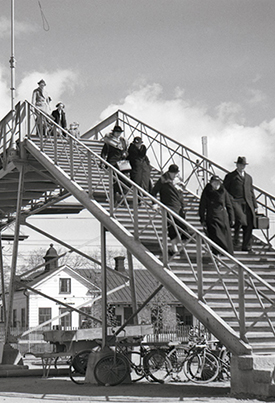Folkhem
Folkhem, literally meaning ‘people’s home’, is a Swedish term for what is otherwise designated as the Swedish welfare state or the Swedish model. It is even used and discussed in the context of the Nordic welfare state or the Nordic political model, and related ideas are prominent throughout the region (e.g. folkelighed, i.e. popular culture, in Denmark). The folkhem metaphor is more complex than is often acknowledged. Its political success is based on its ambiguity and broad appeal through multiple layers of meaning. For example, contemporary adherents of the folkhem concept tend to advocate a green and multicultural reconstruction of society. At the same time, the term folkhem has been adopted by populist and right wing extremist groups to designate their own idea of a closed society.

Folkhem is a characteristically Swedish concept with national connotations that is sometimes used as a synonym for Sweden and written with a capital 'F'.
History of folkhem – social cohesion at its heart
As a metaphor for a harmonious society, the concept of folkhem originated in nationalist conservative and liberal discourses that, in the beginning of the twentieth century, urged integration of the working masses. The concept was adopted in the late 1920s by Per Albin Hansson as a means to formulate the primacy of the Swedish Social Democratic Party, and has been associated ever since with Hansson and his term as prime minister (1932–1946). This period marks the beginning of the dominance of social democracy in Sweden and the foundation of the modern Swedish welfare state, and is often looked back on with a degree of nostalgia. The 1950s and 1960s, when the economy prospered and welfare state reforms became more widely noticeable, are also often considered to be part of the classical folkhem period.
The folkhem section of Hansson’s speech in the parliamentary general debate of 1928 is probably the most frequently quoted Swedish political speech. In it, Hansson describes a utopia within reach and, among other things, maintains that applying the values of the individual home:
“to the great people’s and citizens’ home […] would mean the breakdown of all social and economic barriers which now divide the citizens into privileged and disadvantaged, into rulers and dependents, into rich and poor, propertied and impoverished, plunderers and plundered.”
Since the mid-1970s, and the 1990s in particular, the term folkhem has become increasingly used and contested. It figures prominently in the discourses on the crisis of the welfare state, the crisis of community, and the crisis of modernity.
Nowadays the concept of folkhem is often used in connection with problematic aspects of the Swedish welfare state, e.g. the issue of forced sterilisations. However, this is a retrospective construction as the term folkhem was only used in an inclusive manner by contemporaries. Moreover, it remains often unclear whether such critics mean to point out a discrepancy of idea and practice or a fundamental problem of the folkhem notion itself.
The general tendency today of underlining patriarchal aspects of the folkhem concept, by which citizens are made clients of a benevolent public sector, are problematic as well. The actual use of the term folkhem in the period with which it is primarily associated (c. 1930–1970) shows that it refers to the organic family not only in the sense of an authoritarian father–child relationship, but also with respect to the equality of siblings. At the same time, the concept was widely comprehended as alluding to a modernist construction project by which an inclusive society was built, aimed to provide shelter for all its members. The folkhem metaphor is therefore more complex than often acknowledged, and its political success is based on its ambiguity and the interplay of different levels of meaning.
Current bifurcation
Today, folkhem is mainly a reference back to Sweden in the middle of the twentieth century, with prosperity, high levels of social security, and low exposure to globalisation. Occasionally, politicians of our time advocate a green and multicultural folkhem to describe what they see as a timely reconstruction of society. At the same time, the term folkhem has been adopted by populist and right wing extremist groups as a means to advance their opposing ideas of Sweden as a closed society.
Further reading:
- N. Götz, Ungleiche Geschwister: Die Konstruktion von nationalsozialistischer Volksgemeinschaft und schwedischem Volksheim [Unequal Siblings: The construction of the National Socialist Volksgemeinschaft and the Swedish Folkhem], (Baden-Baden: Nomos, 2001)
- N. Götz, ‘The modern home sweet home’, in K. Almqvist and K. Glans, eds, The Swedish Success Story?, (Stockholm: Axel and Margaret Ax:son Johnson Foundation, 2004).
- O.Ch. Norocel, ‘'Give Us Back Sweden!' A Feminist Reading of the (Re)Interpretations of the Folkhem Conceptual Metaphor in the Swedish Radical Right Populist Discourse’, in Nordic Journal of Feminist and Gender Research 21, 1 (2012), pp. 4–20.